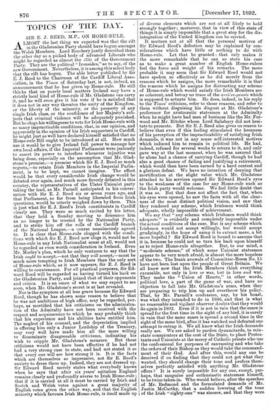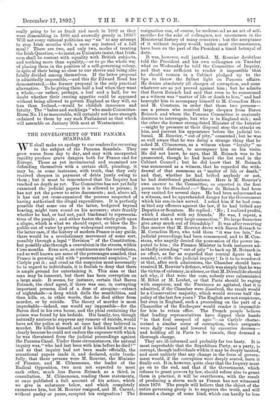SIR E. J. REED, M.P., ON HOME-RULE. A LMOST the last
thing we expected was that the rift in the Gladstonian Party should have begun amongst the Welsh Members. Lord Rosebery justly described them the other day as a picked body of advanced Liberals who might be regarded as almost the elite of the Government Party. They are the political " Ironsides," so to say, of the new Government. Nevertheless, it is among this select body that the rift has begun. The able letter published by Sir E. J. Reed to the Chairman of the Cardiff Liberal Asso- ciation, in the Times of Saturday last, is not, indeed, an announcement that he has given up Home-rule. He still thinks that on purely local matters Ireland may have a strictly local kind of Home-rule if Mr. Gladstone can carry it, and he will even give it his vote if he is satisfied that it does not in any way threaten the unity of the Kingdom, or the liberty of the minority, or the property of any single Irish class, or the confidence of her Majesty's sub- jects that criminal violence will be adequately punished. But he clogs his willingness to vote for Irish Home-rule with so many impracticable conditions, that, in our opinion, and apparently in the opinion of his Irish supporters in Cardiff, he might just as well have declared himself satisfied that no Home-rule Bill ought to be introduced at all. How much use it would be to give Ireland full power to manage her own local affairs, if the Imperial Parliament were jealously to assert its power to interfere whenever injustice was being done, especially on the assumption that Mr. Glad- stone's promise,—a promise which Sir E. J. Reed so much regrets,—to retain Irish Members in the Imperial Parlia- ment, is to be kept, we cannot imagine. The effect would be that every considerable Irish change would be debated over again, and much more fiercely debated in this country, the representatives of the Ulster Unionist party taking the lead, as Mr. Parnell anticipated in his conver- sation with Sir E. J. Reed six or seven years ago, and that Parliament, so far from being liberated from Irish questions, would be utterly weighed down by them. This is just what Sir E. J. Reed's Irish constituents in Cardiff clearly see. They were so much excited by his letter, that they held a Sunday meeting to denounce him as no longer to be trusted by the Nationalist Party, and to strike him off the rolls of the Cardiff branch of the National League,—a course unanimously agreed to. It is clear that Home-rule clogged with the condi- tions with which Sir E. J. Reed now clogs it, would not be Home-rule in any Irish Nationalist sense at all, would not be regarded as even worth consideration in Ireland. Even Mr. Morley's plan, which he only ventures to say that the Irish ought to accept,—not that they will accept,—must be much more tempting to Irish Members than the only sort of Home-rule which, as it now appears, Sir E. J. Reed is willing to countenance. For all practical purposes, Sir Ed- ward Reed will be regarded as having turned his back on the Gladatonian Party, and joined that of their opponents and critics. It is an omen of what we may expect to see soon, when Mr. Gladstone's secret is at last revealed.
Nor is the symptom at all less grave because Sir Edward Reed, though he has shown some reason to believe that be was not ambitious of high office, may be regarded, per- haps, as mortified that his criticisms on the administra- tion of the Admiralty have not been received with the respect and acquiescence to which he may probably think that his experience and his abilities have entitled him. The neglect of his counsel, and the depreciation implied in offering him only a Junior Lordship of the Treasury, may very well have made him all the more willing to disseminate disagreeable criticisms, indicating his wish to cripple Mr. Gladstone's measure. But these criticisms would not have been effective if he had not had a very strong case to state, and had not stated it so that every one will see how strong it is. It is the facts which are themselves so impressive, not Sir E. Reed's anxiety to dress them up. Indeed, they are not dressed up. Sir Edward Reed merely states what everybody knows when he says that after six years' agitation England remains clearly and profoundly averse to Irish Home-rule ; that if it is carried at all it must be carried by Irish and Scotch and Welsh votes against a great majority of English votes given the other way, and that the English minority which favours Irish Home-rule, is itself made up TOPICS OF THE DAY. of diverse elements which are not at all likely to hold strongly together ; moreover, that in view of this state of things it is simply impossible that a great step for the dis- integration of the United Kingdom can be carried.
It matters not at all that the personal motives of Sir Edward Reed's defection may be explained by con- siderations which have little or nothing to do with Home-rule. Let that be granted : that only makes it the more remarkable that he can so state his case as to make a great number of English Home-rulers feel the force and weight of his remarks. The more- probable it may seem that Sir Edward Reed would not have spoken so effectively as be did merely from the reasons which he assigns, the more remarkable it is that the reasons which he assigns for distrusting any scheme- of Home-rule which would satisfy the Irish Members are so coherent, and betray no trace of the arrire-pensee which is supposed to actuate him. He does, indeed, in his reply to the Times' criticism, refer to those reasons, and refer to them without disguising his disgust at Mr. Gladstone's preference for aristocratic statesmen at the Admiralty when he might have had men of business like the Mr. For- wood and Mr. Ritchie whom Lord Salisbury did not hesi- tate to promote. But Sir E. J. Reed also gives us reason to- believe that even if this feeling stimulated the keenness of his perception of the impracticability of satisfying Irish. demands, it was not in any sense self-interested motives- which induced him to remain in political life. He had, indeed, refused for several weeks to return to it, and only gave way at the last moment, when he was assured that he alone had a chance of carrying Cardiff, though he had also a good chance of failing and justifying a retirement, which would then have been earned by a hard contest and a glorious defeat. We have no intention of denying that mortification at the slight value which Mr. Gladstone attached to his services opened Sir Edward Reed's eyes to the weakness of the case for any Home-rule such as the Irish party would welcome. We feel little doubt that it was so. But that does not affect the fact that, when his eyes were opened, he saw the facts with all the clear- ness of the most distinct political vision, and saw that they rendered any scheme, which Irishmen would think adequate, wholly impossible of achievement. We say that "any scheme which Irishmen would think adequate" is evidently and completely impossible under the actual conditions of the case. But is any scheme which. Irishmen would not accept willingly, but would accept grudgingly, in the hope of using it to extract more, a bit more hopeful ? Sir Edward Reed is bound to assume that it is, because he could not so turn his back upon himself as to reject Home-rule altogether. But, to our mind, a " moderate scheme," of which some Unionist statesmen appear to be very much afraid, is almost the more hopeless of the two. The frank avowals of Committee-Room No. 15 have not been lost upon the people of Great Britain. We all know now that the Irish Members think everything excusable, not only in love or war, but in love and war..
They make the " -Union of Hearts," in other words, political love, a part of the game of war, and have no objection to fall into Mr. Gladstone's arms, when they are preparing to trip him up and overthrow his policy.. That, by Mr. Parnell's confession, nay, by his boast, was what they intended to do in 1886, and that is what no reasonable and vigilant observer doubts that they would do again in 1892. Even if it is not in vain that the snare is spread for the first time in the sight of any bird, it is surely in vain that the same snare is spread a second time in the sight of the same bird, after it has watched and defeated one attempt to entrap it. We all know what the Irish demands really are. We are asked to pardon dynamitards, to rein- state conspirators at the cost of the State, to place Protes- tants and Unionists at the mercy of Catholic priests who use the confessional for purposes of canvassing and who take the orders of their Bishop as they would take the command- ment of their God. And after this, would any one be deceived if on finding that they could not get what they wanted, they should change their tone and profess them- selves perfectly satisfied with anything Mr. Gladstone offers ? It is surely impossible for any one, except, per- haps, that sanguine and enthusiastic statesman himself, to be twice taken-in. Who would believe, after the speeches of Mr. Redmond and the formulated demands of Mr. Justin McCarthy, that a sudden lowering of the tone of the Irish "eighty-one" was sincere, and that they were really going to be as frank and meek in 1892 as they were dissembling in 1886 and avowedly greedy in 1890 ? Will not every rational politician say " no " to any attempt to stop Irish mouths with a mere sop instead of a full meal ? There are two, and only two, modes of treating the Irish Question,—to insist, as Unionists insist, that Irish- men shall be content with equality with British subjects, and nothing more than equality,—or to go the whole wa.r of placing them in the position of a self-governing colony, in spite of their being so close to our shores and being also fatally divided among themselves. If the latter proposal is admittedly impossible,—and this Sir Edward Reed has demonstrated,—the former proposal is the only practical alternative. To be giving them half a loaf when they want a whole,—or rather, perhaps, a loaf and a half, for we doubt whether their craving appetite could be appeased without being allowed to govern England as they will, no less than Ireland,—would be childish innocence and fatuity. The " babes and sucklings " who made Committee- Room No. 15 so memorable, will certainly not have strength ordained to them by any such Parliament as that which will assemble on January 30th next at Westminster.







































 Previous page
Previous page